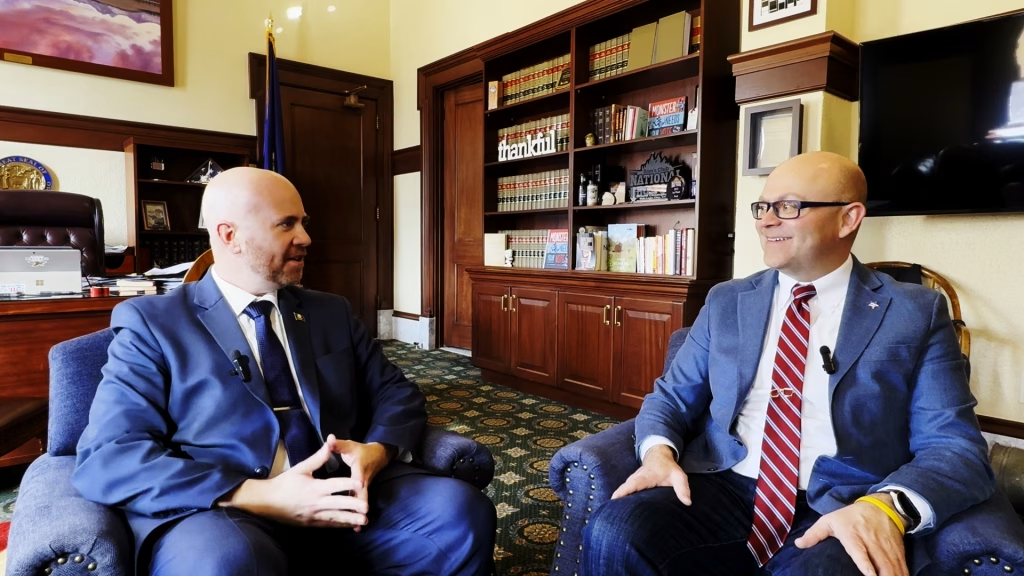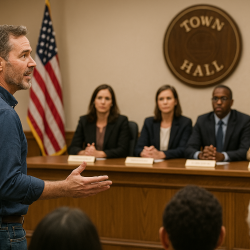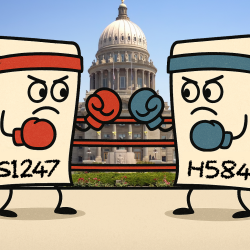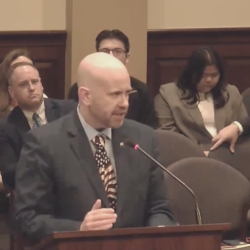We all understand that pure democracy is mob rule, two wolves and a sheep deciding on what to have for dinner, which is why our Founding Fathers structured their new nation as a representative republic. Citizens cast their votes for representatives, while state legislatures appointed senators, and they all worked together in Congress to craft laws for the nation. Our founders also wrote a strong Constitution with a Bill of Rights to protect life, liberty, and property for the citizens, no matter what laws Congress passed.
After the first United States census, the House of Representatives had 105 members. Each congressman represented an average of 37,000 citizens (including slaves). As the population of our country grew, so did the House, reaching 435 after the 1930 census. However, Congress passed a law capping the size of the House at 435, so it remains there today. This means that congressmen represent an average of 750,000 people, more than 20 times what it was in the early days of our republic.
Conversely, in the early days of America, the federal government was relatively weak. They had authority over foreign policy, tariffs, organizing new territories, post offices, and not much else. Today, that same federal government has a multi-trillion dollar budget and micromanages regulations over everything from food production to small businesses, yet we are less represented than ever. Even worse, Congress has outsourced a tremendous amount of regulatory power to the unaccountable federal bureaucracy, which is entirely removed from oversight by voters.
Earlier this week, both the House and the Senate approved a new National Defense Authorization Act. Unlike in the Idaho Legislature, where bills must have a single subject, the federal Congress often packs up hundreds or even thousands of issues into a single omnibus bill. That gives cover to representatives who vote in favor of the NDAA or other omnibus spending bills by claiming that they supported pay raises for the troops or something else nobody could disagree with.
That’s exactly what Senators Jim Risch, Mike Crapo, and Rep. Mike Simpson did with the recent NDAA. Despite pressure from conservative constituents and media to vote against the bill because of the way it funded abortion and woke nonsense as well as reauthorizing the corrupt FISA system that allows intelligence agencies to spy on American citizens, all three voted yes and then issued press releases patting themselves on the back for giving pay raises to military personnel.


(Notice that both tweets were severely ratioed, that is, they received a lot more replies than likes. That indicates strong disapproval.)
It makes you wonder who Risch, Crapo, Simpson, and the rest of our elected leaders truly represent. The American people want the government to protect our southern border, stop spending us into hyperinflation, and do something about rising crime, but the priorities of our elected leaders is to pay lip service to the border, spend more money and give as much as possible to foreign nations and defense contractors, and ignore the deterioration of our biggest cities.
Maybe they truly believe that what’s good for Raytheon is good for America. In any case, it’s clear that neither the House nor the Senate really calls the shots. Who writes these massive omnibus bills? It’s not any individual congressman or senator, rather it’s their staffs, the bureaucrats in the Executive Branch, and their lobbyist friends who create the actual text that becomes law without ever being read. Ergo, the real center of power in our nation is not in Congress, but diffused throughout hundreds of federal agencies and bureaucracies.
Unfortunately, there is little that you or I can do about that. However, we still have a chance to make some change at the local level. Idaho legislators face the same temptation as their DC counterparts to assume that whatever is good for Micron or St. Luke’s is good for Idaho. Thankfully, our representatives must vote on each bill separately, but they still vote to increase the state budget and deliver taxpayer funded handouts to the big businesses that bankroll their campaigns.
To see who represents big businesses and special interests closer to home, look no further than the Twitter account of the Idaho Association of Commerce and Industry (IACI). Its PAC, the Idaho Prosperity Fund, endorsed 56 current legislators and candidates. Of those, 37 voted in favor of H24, the Idaho Launch Grant, which delivers $8,000 per graduate to businesses for workforce training, while 8 voted no, including Speaker Mike Moyle. An additional 8 are not currently in the Legislature.
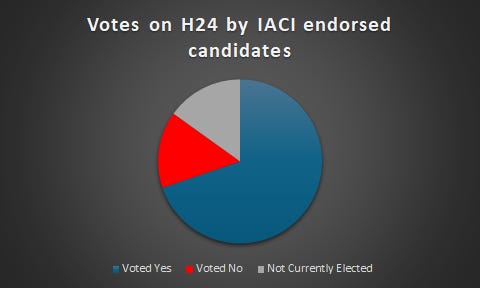
Defenders of the political establishment like to say that liberty-minded conservatives are “extremists” who are funded by “out of state dark money”. However, consider the agenda of these supposed extremists: less government spending, smaller government agencies, more transparency for voters, and a return to traditional conservative values. Contrast that with the establishment agenda which is more spending, bigger government, less transparency, and a complete disregard for traditional values. IACI doesn’t care that Sen. Geoff Schroeder voted in favor of genital mutilation surgeries for children or to protect obscene materials in schools and libraries so long as he keeps the money flowing.
There is a fundamental difference in the worldviews of someone like Scott Herndon and someone like Britt Raybould, just to pick a notable example from each camp. The former sees government as a necessary evil and works to constrain it to a very limited role, while the latter sees government as a tool to do whatever she thinks is a good idea at the time. The former remembers that every penny that Idaho spends came from a hardworking citizen, while the latter thinks those pennies are hers to do with as she pleases.
The latter says “I’m from the government and I’m here to help,” while the former remembers that Ronald Reagan called those the nine scariest words in the English language.
What’s good for Micron is not always good for Idaho. Sure, it and companies like it employ a lot of people and build things that are necessary for modern society, but consider how many people were fired for not taking an experimental vaccine, or how many jobs were lost because it was cheaper to outsource them to the developing world. Consider that corporations used to invest in themselves and in their communities, while today they invest in lobbyists to push for tax breaks, subsidies, and favorable regulations. Today, “giving back to the community” means sponsoring celebrations of debauchery like Boise Pride Fest.
As you prepare to vote in the primary election next May, remember who represents you, and who represents big businesses and special interests. Pay close attention to how your legislators vote in the upcoming session, and which lobbyists they listen to the most. Keep an eye on campaign donations — were those mailers you got in your postbox paid for by grassroots donors, or by big corporations whose interests do not necessarily align with yours?
Remember that you still have a voice at the local level. Congressmen Russ Fulcher and Mike Simpson each represent nearly a million Idahoans, but your legislators represent only around 50,000, and you have three to choose from. It is in state government that we still see a glimmer of the system our founders intended, and it is here that we can still make a difference.
About Brian Almon
Brian Almon is the Editor of the Gem State Chronicle. He also serves as Chairman of the District 14 Republican Party and is a trustee of the Eagle Public Library Board. He lives with his wife and five children in Eagle.





